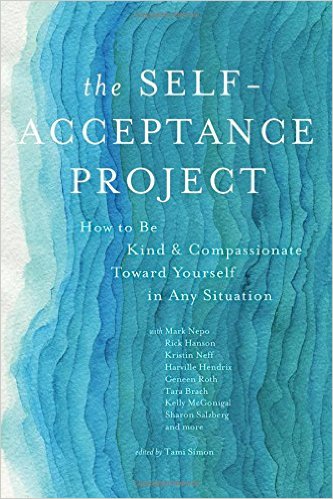We tend to look at our “negative” emotions as a nuisance at best or with anger at worst. We judge ourselves for feeling sad or lonely. We judge ourselves for feeling anxious. Often we just want these feelings to go away. Often we pretend they don’t exist in the first place. This is understandable. Maybe we weren’t taught to process our emotions. Maybe we’d simply rather feel good instead of heavy, weighed down and hurt. Again, totally understandable.
And that’s hard. Because these feelings don’t dissipate. They don’t go away.
In the new book The Self-Acceptance Project: How to Be Kind & Compassionate Toward Yourself in Any Situation, contributor Jeff Foster includes a beautiful passage on grief—one of the toughest emotions to experience. It’s a passage that reminds us how we can just be with an emotion, without trying to change it, without hating ourselves for feeling it, without doing anything. It reminds us that feeling a range of emotions is normal and universal and totally OK. It is part of life and being human. In fact, it might even be bigger than us.
Foster writes:
Say I’m sitting with my dear father, and I notice a wave of grief inside me. I don’t turn away from it. I don’t even try to work out why it is there, whether it’s his or mine, or even what caused it. It doesn’t matter. It’s an old friend, come to me for healing, for holding, for love. To love my own grief is to love my father’s grief and to love the grief of all my ancestors; it is to love the grief of all humanity, of all beings throughout time who have loved and lost and wondered why. If I turn away from this grief and pathologize it, I am turning away from all of life. I’m turning away from God. I’m turning away from compassion, from all those who grieve on this planet, from the universe itself, from the Big Bang, the dinosaurs, all the planets, the stars, the flowers, the future generations—the whole thing. Perhaps this grief is a language that we’ve never learned to speak—perhaps this grief is huge love in disguise; perhaps all feelings are. “I bow to you,” I say. And I breathe into the grief, and it softens, becomes very tender, loving, saturated with presence, and I reconnect with my father again in the moment, even in the midst of grief. It’s quite beautiful…the heart soft and tender.
The next time you’re experiencing a tough emotion, take several deep breaths, and try to sit with it. Even for a few minutes. You might even look at it as an old friend, like Foster does. Look upon it with compassion (or at least not as a nemesis). You might remind yourself that this emotion reconnects you to yourself and even something bigger. You might honor the presence of this emotion and thereby honor yourself. Like anything, this takes practice. We just have to open ourselves to the idea that this practice is worth it. And it is.
(c) Weightless – Read entire story here.
